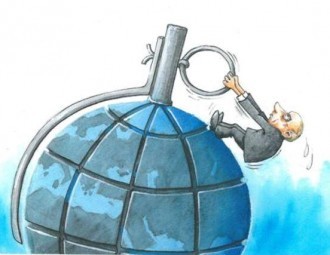Uladzimir Matskevich: Kremlin is leading the game aimed at prolongation of conflict in Donbas

Putin regime has nothing to fear as long as Russian society is concentrated on the Russia-Ukraine war.
After the leaders of the “Normandy four” signed the Minsk agreements on February 11-12, 2015 truce at Donbas, however complicated, has been lasting for two months now. But the head of the “DPR” Alexander Zaharchenko has already told BBC that the Minsk agreements are doomed, while Vladimir Putin didn’t exclude the possibility of recognizing “DPR” and “LPR”.
Is the current truce leading to peace or is it the lull before the storm? “EuroBelarus” Information Service discussed it with Uladzimir Matskevich, philosopher and methodologist, the head of the Board of the International Consortium “EuroBelarus “.
- How steady or unsteady are Minsk agreements?
- Indeed, truce in Donbas isn’t some kind of myth. It means that the war in Donbas hasn’t finished yet. This war is recognized by the world community, Ukraine and Belarus, even if not in the very official statements. It is only Russia that doesn’t recognize its participation in the war, supporting “DPR” and “LRP” puppet formations.
Accordingly, supporting puppet formations and not recognizing participation in the war, Russia cannot sign peace, whereas puppet formations are not authorized to sign them, as they are not recognized and cannot be. Reaching peace in Ukraine is very problematic now. Truce can last as long as one wants, but the situation won’t be resolved until the correspondent agreements between Russia and Ukraine is signed.
Situation in Donbas reminds us of Abkhazia and South Ossetia, and also of Transdniestria – prolonged situations with unrecognized state formations that are supported by one of the parties and that are fighting to build their own economies, often at criminal or half-criminal schemes.
Such situation can last for decades and even centuries. We see practically the same situation in Taiwan. As a state formed by the receded Kuomintang troops, Taiwan isn’t recognized by the People's Republic of China that is still at war with Taiwan, though the war isn’t led. We can cite a lot of similar examples from history.
Besides, no one recognizes and no one will recognize Crimea’s occupation by Russia – this is another pain spot in Russia-Ukraine relations.
- Over a two-month truce Russia has supplied about 70 multiple launch rocket systems (MLRS), about 30 infantry fighting vehicles (IFV), about 45 armoured personnel carriers (APC), about 200 tanks, and about 900 lorries. Does it mean that the new wave of the conflict’s escalation is under preparation?
- There is no univocal answer to that. If Russia and Ukraine are still at war, we need to revert to the war logic. Each of the parties at war tries to mislead the opponent. It can be done with the help of long-term displacement of military formations or military equipment or with the help of similar actions that attract the attention of the intelligent services and escalating the oppressive atmosphere, thus making the opponent – in our case Kiev – take certain decisions. I don’t exclude that the truce is concluded for a long time.
This war is very unbeneficial for Kiev; on the one hand, Ukraine can’t recognize occupation of Crimea, Donetsk, and Lugansk regions, but on the other it can’t be at war due to economic, political, and social problems that it has to resolve, too. Preparation to war and the war itself only postpone their resolution.
Thereafter, stabilization and normalization of the situation in Ukraine is not to Russia’s advantage. Thus, escalating the oppressive atmosphere now is one of the ways to exert pressure on Ukraine.
One more way to pressurize Ukraine is preparation of terroristic attacks. Ukraine suffered a wave of notorious murders and there are no reliable facts as to who organized them.
- How big is the threat that intervention to Ukraine, where according to Kremlin’s propaganda “fascist junta” is ruling, would be timed to the Victory Day, the day of victory over Nazi invaders?
- It would be very silly to time another escalation of hostilities to some symbolic dates, though we can’t exclude such possibility, as many military actions of Russia in Donbas are dictated by ideological motives aimed at the Russian society. And this direction has a clear and pragmatic goal – to distract Russian society from Russia's inner problems as much as possible. Putin and Kremlin’s regime used escalation of situation in Ukraine in order to distract the attention from inner-Russian problems with the help of “little victorious war”.
But inner-Russian problems still remain. And Putin regime has nothing to fear as long as Russian society is concentrated on the Russia-Ukraine war. As soon as the situation in Ukraine stabilizes – either through prolongation of truce or through withdrawal of forces and cessation of Russian aggression – inner Russian problems will immediately come first on the agenda; problems that Putin and Kremlin’s regime are unable to resolve.
That is where the situation that we indicate originates from: it isn’t war, it isn’t peace, prolonged truce without real resolution of situation, attempt to manipulate Russia’s public opinion and exert pressure on Ukraine.
- Putin didn’t exclude the possibility of recognizing “DPR” and “LPR”, or, to be more precise, he evaded this question. In your opinion, what does the recognition or non-recognition of the terroristic formations depend on?
- Diplomatic game in prolongation of conflict is starting. Recognition of Abkhazia and South Ossetia didn’t affect international politics and settlement of international Russian-Georgian relations; likewise official recognition of “DPR” and “LPR” won’t affect international stance of Russia and attitude of the US and EU towards Ukraine and won’t bring about recognition of puppet formations of half-bandit criminal character by other countries. I think Belarus won’t recognize criminal “DPR” and “LPR”.
The game in prolongation of conflict is going on.
-
03.01
-
07.10
-
22.09
-
17.08
-
12.08
-
30.09










































